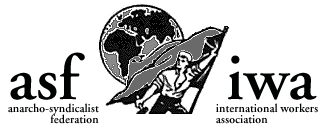|
A Brief Herstory of the Melbourne ASF What is now the Melbourne Local of the ASF grew out of the Anarcho-Syndicalist Group of Melbourne, which was was formed in January 1997 after a blossoming of interest in anarcho-syndicalism amongst Melbourne anarchists and workers. It attracted the attention of others and began to grow in the next few months. In April, the ASG-M was constituted and secretarial and treasurer duties delegated to group members for six month terms. In its short time in existence, the ASG-M undertook a number of activities, relative to its numerical strength and resources. Primarily, these were focused on self-education and promotion of anarcho-syndicalist aims and principles. The ASG-M held monthly public meetings on such topics as "Feminism compared to Anarcho-Syndicalism", "Sexual Politics and Anarcho-Syndicalism" and "What is Anarcho-Syndicalism?". It published classics of anarcho-syndicalist literature such as Rudolf Rocker's "Anarchism and Anarcho-Syndicalism", a phamphlet called "Anarchism In Australia Today", and produced stickers, posters and leaflets of various kinds, which were distributed around Melbourne and surrounding areas. In 1998 the ASG-M organised a protest action against the Chilean embassy in Melbourne, in solidarity with Solidaridad Obrera, the Chilean section of the International Worker's Association (IWA), who at the time were fighting with the native Mapuche people to defend their land from planned "development". During the now-infamous Waterfront Dispute the ASG-M showed solidarity with the waterfront workers and rank and file of the MUA picketing on the East Swanston docks. The ASG-M was also involved in actions against the new automated ticket machines brought in on all public transport at the expense of people's jobs that provided a social service. The ASG-M showed solidarity and organised with the tram conductors to take direct action to try to save their jobs that would be lost to the new ticketing machines. Some of the energy of the ASG-M was also taken up by its efforts to resolve the problems surrounding the situation between the Syndey and Melbourne groups of the Anarcho-Syndicalist Federation (ASF) at the 1992 congress. The Sydney (Rebel Worker) Group was expelled due to a breach of statues, but continued to call itself the ASF-IWA even after the federation had disbanded. At this time, it appears that the dispute has been resolved in favour of the organisation which is now called the ASF (ie. yours truly), which, as far as the ASF is concerned, bodes well for the unhampered development of a truly liberatory union movement. In addition to its efforts to promote the principles of worker solidarity and mutual aid, direct action and self-management, the ASG-M also attempted to overcome some of the misunderstandings of anarcho-syndicalism created by what are arguably dogmatics within the anarcho-syndicalist and revolutionary union movement; in particular, but by no means limited to, the idea that anarcho-syndicalism is singularly concerned with organisation at the point of production. Although it denied that social change is possible without this form of organisation, given that productive activity forms the basis for the existence of society and that the way it is carried out is an issue which affects everyone, it also acknowledged that community and social struggles using direct action are also an important component of social change. For that reason the ASG-M also actively opposed and challenged attitudes and behaviour that arbitarily divide workers, such as homophobia, sexism and racism. In 2000 the ASG-M, together with the newly-formed Anarcho-Syndicalist Group of Sydney and Anarcho-Syndicalist Group of Perth, held an ASF reformation conference in Melbourne. The Anarcho-Syndicalist Federation thus reformed, the basis was laid for reentry to the International Workers Association (the international of anarcho-syndicalist and revolutionary unions). Although those involved in this process were occasionally criticised for wasting time on supposedly bureaucratic fumling while the class war awaited, we believe that creating a functioning anarcho-syndicalist union and then resolving the problems association with the ASF split, was necessary in order to clear up the relationship of our union to the rest of the world, and in doing so to create a concrete basis for workers internationalism in this part of the world. At the end of 2000 the ASF sent a delegate to the IWA congress, where the ASF was given "Friends of the IWA" status. We expect to be affiliated as an IWA section at a plenary to be held during 2001. Thus reconstituted, the ASF hopes to be able to continue to develop and to join up with other anarcho-syndicalist and revolutionary union groups around Australia, and looks forward to such occurences as the first small steps towards the development of a democratic, worker-run union movement, one which relies on individual initiative, workers solidarity and direct action rather than lifeless bureaucracy, and one which is capable of bringing about a revolutionary general strike, social revolution, and the reconstitution of social life on the basis of a direct, participatory democracy and worker's self-management of production. > home |

